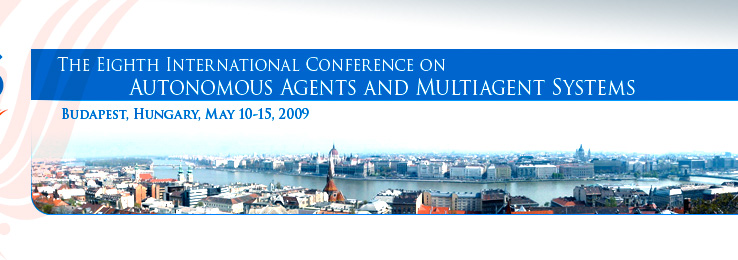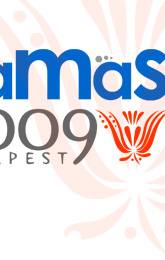| |
 |
 |
| PANELS |
|
Agent Oriented Methodologies and Programming Languages: Towards Practical Systems
Chair:
Keith Decker (University of Delaware, USA)
Participants:
Klaus Fischer (DKKI, Germany) (bio)
Andrea Omicini (University of Bologna, Italy)
Amal El Fallah Seghrouchni (University Paris VI, France) (bio)
Milind Tambe (University of Southern California, USA) (bio)
Theoretical Foundations for Agents and MAS: Is Game Theory Sufficient?
Chair:
Jaime Sichman (University of Sao Paulo, Brazil)
Participants:
Rosaria Conte (ISTC, Italy) (bio)
Jacques Ferber (University of Montpellier, France) (bio)
Wiebe van der Hoek (University of Liverpool, UK) (bio)
Jeffrey Rosenschein (Hebrew University of Jerusalem, Israel) (bio)
******************************************************************************
Rosaria Conte
ISTC, Italy
|
Rosaria Conte is head of the LABSS (Laboratory of Agent Based Social Simulation) at the ISTC (Institute for Cognitive Science and Technology), and teaches Social Psychology at the University of Siena.
She is a cognitive and social scientist, with a special interest for the study of positive social action (altruism, cooperation and social norms), and reputation-based social regulation. Quite active in the MAS field, she contributed to launch the field of social simulation in Europe. She is coordinator of both European and Italian research projects. She is President of the European Society of Social Simulation ( ESSA), coordinating the section on Special Interest Groups, and of the Italian Association of Cognitive Science.
Rosaria has published about 120 among scientific articles and books on cognitive social agents, norms representation and reasoning, and agent-based simulation. Her research interests range from Agent Theory to Multi Agent Systems, from Agent-Based Social Simulation and Cultural Evolution to Info-societies and Virtual Markets. |
Klaus Fischer
DKKI, Germany
|
Klaus Fischer is research fellow, head of the Multiagent System Group and deputy head of the Agents and Simulated Reality Department at the German Reserach Center for Artificial Intelligence (DFKI) GmbH.
After studying computer science at the Technische Universität (TU) in München he worked from 1986 to 1991 in the joint research project SFB 331 Information Processing in Autonomous Mobile Robot Systems at the Department of Computer Science at the TU München. In 1992 he finished his doctoral degree with his thesis on Distributed and Cooperative Planning in a Flexible Manufacturing System.
In January 1992 he joined the Multiagent System Research Group at DFKI GmbH in Saarbrücken in the department of Deduction and Multiagent Systems headed by Prof. H. J. Siekmann and assumed the responsibility of group leader in November 1993. Since then he lead numerous research
and industrial projects. Significant contributions were on applying multiagent systems in logistics and supply chain management. More recently his focus shifted towards model-driven development of
multiagent system. The EC funded projects ATHENA, COIN, and SHAPE formed the context of this work.
Klaus Fischer acted in the program committees of major conferences and workshops (e.g. AAMAS, HOLOMAS, CLIMA) and organized several workshops (more recently that ATOP workshop series) and has chaired major scientific events (e.g. EASSS 2000). He is member of the editorial board of international journals (e.g. JAAMAS, APIN) and has published some 80 articles in scientific conferences, workshops, and journals and published 4 books.
|
Wiebe van der Hoek
University of Liverpool, UK
|
Prof van der Hoek is since 2002 a member of the Agent ART group at the Computer Science Department at the University of Liverpool. His research interests include Modal Logics for Knowledge and Cooperation. He co-authored books on Dynamic Epistemic Logic and on Epistemic Logic, and he is editor-in-chief of Knowledge, Rationality and Action. Before he joined Liverpool, he was a member of the Intelligent Systems Group in Utrecht, after he obtained his PhD at the Free University of Amsterdam.
|
Andrea Omicini
University of Bologna, Italy
|
Andrea Omicini is Professor at the DEIS, Department of Electronics, Informatics and Systems of the Alma Mater Studiorum-Universita di Bologna, Italy. He received both his laurea degree in electronic engineering and his PhD in computer engineering from the Alma Mater.
He has published over 200 articles on multiagent systems, coordination, software engineering, software infrastructures, and programming languages, and has edited 15 books and guest-edited 10 international journal special issues on agent-related issues. He has held several tutorials on agent-based systems and coordination models at international conferences and schools, and is currently serving as a member of the Advisory Board of the EASSS 2009 Summer School. He has organised and chaired international conferences and workshops: among his services, he worked as the Organising Co-Chair and Treasurer of the first AAMAS conference (Bologna 2002) the Program Chair of CIA 2003, ACM SAC 2004 & 2005, EUMAS 2006, and the co-founder of the DALT, ESAW and SELMAS workshop lines, as well as a member of the first Steering Committee of the COIN workshop series. He served as the Coordinator of the AgentLink III Technical Fora, worked 4 years as the Chair of the SIG on Agents and Multi-Agent Systems of the Italian Association for Artificial Intelligence (AI*IA), and is currenty the ACM Representative in the IFIP Technical Committee 12 "Artificial Intelligence".
|
Jeffrey Rosenschein
Hebrew University of Jerusalem, Israel
|
Jeff Rosenschein is a Professor of Computer Science at the Hebrew University of Jerusalem, Israel, and director of its Multiagent Systems Research Group. His research interests revolve around issues of cooperation and competition among agents, and the use of economic theory, voting theory, and game theory to establish appropriate foundations for Multiagent Systems. Rosenschein received an AB in Applied Mathematics from Harvard University (1979), and an MS (1982) and PhD (1986) in Computer Science from Stanford University. Prof. Rosenschein co-authored the book, "Rules of Encounter: Designing Conventions for Automated Negotiation among Computers", published by MIT Press in 1994, which explored how automated agents can be designed in ways that allow them to reach cooperative agreements, or cope with inevitable conflicts. |
Amal El Fallah Seghrouchni
University Paris VI, France
|
Amal El Fallah Seghrouchni is Full Professor at the University Pierre and Marie Curie (Paris 6 - France). She is researcher at LIP6 laboratory (University Pierre and Marie Curie and CNRS - UMR7606) where she heads the Multi-Agent Systems team. She is also the president of the French "College SMA" which federates more than 42 French teams working in the domain of intelligent agents and Multi-Agent Systems.
Her main research topics are "Analysis, Design and Validation of Multi-Agent Systems". She published more than 100 papers in the major conferences of MAS field, co-edited several books or post-proceedings and co-organised several international events dedicated to Multi-Agent Systems (e.g. the series of ProMAS workshops as a satellite event of AAMAS since 2003, LADS workshop as an associated event with MALLOW 2007 and 2009, and Dagstuhl seminars).
Amal El Fallah Seghrouchni is also involved in several international program committees as AAMAS, ECAI, etc. Se has been vice co-chair of the international conference IEEE/ACM WI-IAT (2005 and 2006 editions). As invited professor, she gave talks in international seminar and courses for up-graduated students about multi-agent planning, coordination, protocols of interaction, mobile computing, and programming multi-agent systems, etc.
|
Milind Tambe
University of Southern California, USA
|
Milind Tambe is a Professor of Computer Science at the University of Southern California (USC). He received his Ph.D. from the School of Computer Science at Carnegie Mellon University. He is a fellow of AAAI (Association for Advancement of Artificial Intelligence), recipient of the ACM/SIGART Agents Research award, and recipient of a special commendation given by the Los Angeles World Airports (LAX) police from the city of Los Angeles for design and deployment of the ARMOR Program at LAX. Dr. Tambe is also recipient of the Okawa foundation faculty research award, the RoboCup Scientific Challenge Award for oustanding research and the ACM recognition of service award. His papers have been selected as best papers or finalists for best papers at 10 premier agents conferences and workshops including AAMAS. Playing a foundational role in the International Joint Conference on Agents and Multiagent Systems (AAMAS), he has previously served on the board of directors of the International Foundation for Agents and Multiagent Systems (IFAAMAS) and related steering committees, as well as general co-chair of AAMAS (2004). |
|
|
|
|
|



